Deck 24: Biomolecules: Nucleic Acids and Their Metabolism
Question
Question
Question
Question
Question
Question
Question
Question
Question
Question
Question
Question
Question
Question
Question
Question
Question
Question
Question
Question
Question
Question
Question
Question
Question
Question
Question
Question
Question
Question
Question
Question
Question
Question

Unlock Deck
Sign up to unlock the cards in this deck!
Unlock Deck
Unlock Deck
1/34
Play
Full screen (f)
Deck 24: Biomolecules: Nucleic Acids and Their Metabolism
1
Which reagent is used to accelerate coupling reactions in both laboratory peptide synthesis and laboratory DNA synthesis?
A) catalytic H+
B) dicyclohexylcarbodiimide (DCC)
C) ethyl chloroformate
D) NaOH
E) PhS− NH4+
A) catalytic H+
B) dicyclohexylcarbodiimide (DCC)
C) ethyl chloroformate
D) NaOH
E) PhS− NH4+
dicyclohexylcarbodiimide (DCC)
2
DNA can best be described as
A) two backbones of alternating deoxyribose and nitrogenous base on the exterior, with phosphates on the interior
B) two backbones of alternating deoxyribose and nitrogenous base on the interior, with phosphates on the exterior
C) two backbones of alternating deoxyribose and phosphate on the exterior, with nitrogenous bases on the interior
D) two backbones of alternating deoxyribose and phosphate on the interior, with nitrogenous bases on the exterior
E) two backbones of alternating nitrogenous base and phosphate on the exterior, with deoxyriboses on the interior
A) two backbones of alternating deoxyribose and nitrogenous base on the exterior, with phosphates on the interior
B) two backbones of alternating deoxyribose and nitrogenous base on the interior, with phosphates on the exterior
C) two backbones of alternating deoxyribose and phosphate on the exterior, with nitrogenous bases on the interior
D) two backbones of alternating deoxyribose and phosphate on the interior, with nitrogenous bases on the exterior
E) two backbones of alternating nitrogenous base and phosphate on the exterior, with deoxyriboses on the interior
two backbones of alternating deoxyribose and phosphate on the exterior, with nitrogenous bases on the interior
3
Consider the RNA dinucleotide GU.
a)Draw the full structure of the RNA dinucleotide GU and label the 3' and 5' ends.
b)How would this dinucleotide differ if found in DNA?
a)Draw the full structure of the RNA dinucleotide GU and label the 3' and 5' ends.
b)How would this dinucleotide differ if found in DNA?
a) 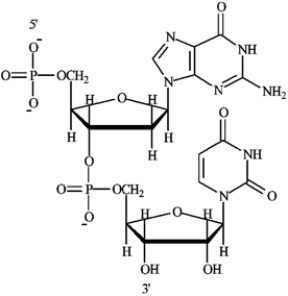 b)The ribose sugar would deoxyribose and the base uracil would be replaced with thymine.
b)The ribose sugar would deoxyribose and the base uracil would be replaced with thymine.
 b)The ribose sugar would deoxyribose and the base uracil would be replaced with thymine.
b)The ribose sugar would deoxyribose and the base uracil would be replaced with thymine. 4
What is the anticodon sequence in tRNA that corresponds the following segment of mRNA?
(5') CUU−AGC−UGG−CCC(3')
(5') CUU−AGC−UGG−CCC(3')

Unlock Deck
Unlock for access to all 34 flashcards in this deck.
Unlock Deck
k this deck
5
Describe, in general terms, the steps involved in the automated synthesis of the DNA sequence GCT.

Unlock Deck
Unlock for access to all 34 flashcards in this deck.
Unlock Deck
k this deck
6
What amino acid sequence is coded by the following segment of DNA?
(5') TTA−GCC−GTA−CTA−AAA (3')
(5') TTA−GCC−GTA−CTA−AAA (3')

Unlock Deck
Unlock for access to all 34 flashcards in this deck.
Unlock Deck
k this deck
7
Which is true?
A) Both DNA and RNA are completely double-stranded.
B) Both DNA and RNA are completely single-stranded.
C) Both DNA and RNA contain ribose.
D) Both DNA and RNA contain uracil.
E) Both DNA and RNA contain phosphate.
A) Both DNA and RNA are completely double-stranded.
B) Both DNA and RNA are completely single-stranded.
C) Both DNA and RNA contain ribose.
D) Both DNA and RNA contain uracil.
E) Both DNA and RNA contain phosphate.

Unlock Deck
Unlock for access to all 34 flashcards in this deck.
Unlock Deck
k this deck
8
What sequence of bases on the second strand of DNA is complementary to the following?
(5') GCATTA (3')
(5') GCATTA (3')

Unlock Deck
Unlock for access to all 34 flashcards in this deck.
Unlock Deck
k this deck
9
Which of the following is 2-deoxy-D-ribose? A  B
B  C
C  D
D 
A) A
B) B
C) C
D) D
 B
B  C
C  D
D 
A) A
B) B
C) C
D) D

Unlock Deck
Unlock for access to all 34 flashcards in this deck.
Unlock Deck
k this deck
10
Answer the following questions.
a)If the following segment of mRNA
(5') CUU−AGC−UGG−CCC (3')
was changed to
(5') CUU−AGC−UGG−CCU (3')
how would the synthesized protein change?
b)If the following segment of mRNA
(5') CUU−AGC−UGG−CCC (3')
was changed to
(5') CUU−AGC−UGA−CCU (3')
how would the synthesized protein change?
a)If the following segment of mRNA
(5') CUU−AGC−UGG−CCC (3')
was changed to
(5') CUU−AGC−UGG−CCU (3')
how would the synthesized protein change?
b)If the following segment of mRNA
(5') CUU−AGC−UGG−CCC (3')
was changed to
(5') CUU−AGC−UGA−CCU (3')
how would the synthesized protein change?

Unlock Deck
Unlock for access to all 34 flashcards in this deck.
Unlock Deck
k this deck
11
The bond between the nitrogenous base and the sugar in a nucleoside is a glycosidic bond. Which type of reagent should cleave this bond?
A) acid
B) base
C) acid or base
D) neither acid nor base
E) It depends on which nitrogenous base and which sugar are present.
A) acid
B) base
C) acid or base
D) neither acid nor base
E) It depends on which nitrogenous base and which sugar are present.

Unlock Deck
Unlock for access to all 34 flashcards in this deck.
Unlock Deck
k this deck
12
Consider the following structure. 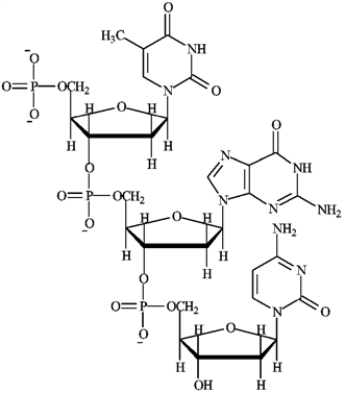 a)Circle any nucleoside.
a)Circle any nucleoside.
b)Draw a box around any nucleotide.
c)
Identify as DNA or RNA.
 a)Circle any nucleoside.
a)Circle any nucleoside.b)Draw a box around any nucleotide.
c)
Identify as DNA or RNA.

Unlock Deck
Unlock for access to all 34 flashcards in this deck.
Unlock Deck
k this deck
13
What mRNA sequence is complementary to the following DNA base sequence?
(5') TAAGGCGATA (3')
(5') TAAGGCGATA (3')

Unlock Deck
Unlock for access to all 34 flashcards in this deck.
Unlock Deck
k this deck
14
In some instances, base pairs other than the familiar G−C and A−T matches can form. For these alternate pairs to form, one of the two bases must tautomerize. Based on this information, draw a C−A pair and determine the number of hydrogen bonds that would stabilize the pair.

Unlock Deck
Unlock for access to all 34 flashcards in this deck.
Unlock Deck
k this deck
15
How many hydrogen bonds are present in a G−C base pair and an A−T base pair, respectively?
A) 1, 2
B) 2, 2
C) 2, 3
D) 3, 2
E) 3, 3
A) 1, 2
B) 2, 2
C) 2, 3
D) 3, 2
E) 3, 3

Unlock Deck
Unlock for access to all 34 flashcards in this deck.
Unlock Deck
k this deck
16
A double-stranded DNA molecule that contains 22%, on a mole basis, T must also contain
A) 11% G
B) 22% G
C) 28% G
D) 56% G
E) 78% G
A) 11% G
B) 22% G
C) 28% G
D) 56% G
E) 78% G

Unlock Deck
Unlock for access to all 34 flashcards in this deck.
Unlock Deck
k this deck
17
Base pairs in DNA are
A) parallel to each other and parallel to the long axis of the DNA molecule
B) parallel to each other and perpendicular to the long axis of the DNA molecule
C) parallel to each other, with random orientations to the long axis of the DNA molecule
D) perpendicular to each other, with every other base pair parallel to the long axis of the DNA molecule
E) perpendicular to each other, with random orientations to the long axis of the DNA molecule
A) parallel to each other and parallel to the long axis of the DNA molecule
B) parallel to each other and perpendicular to the long axis of the DNA molecule
C) parallel to each other, with random orientations to the long axis of the DNA molecule
D) perpendicular to each other, with every other base pair parallel to the long axis of the DNA molecule
E) perpendicular to each other, with random orientations to the long axis of the DNA molecule

Unlock Deck
Unlock for access to all 34 flashcards in this deck.
Unlock Deck
k this deck
18
Rank DNA, mRNA, and tRNA from largest to smallest.
A) DNA > mRNA > tRNA
B) DNA > tRNA > mRNA
C) mRNA > tRNA > DNA
D) mRNA > DNA > tRNA
E) tRNA > mRNA > DNA
A) DNA > mRNA > tRNA
B) DNA > tRNA > mRNA
C) mRNA > tRNA > DNA
D) mRNA > DNA > tRNA
E) tRNA > mRNA > DNA

Unlock Deck
Unlock for access to all 34 flashcards in this deck.
Unlock Deck
k this deck
19
The phosphodiester linkages in DNA and in RNA are, respectively:
A) 2' to 3', 3' to 2'
B) 2' to 5', 5' to 2'
C) 3' to 5', 5' to 3'
D) 3' to 5', 3' to 5'
E) 5' to 5', 3' to 3'
A) 2' to 3', 3' to 2'
B) 2' to 5', 5' to 2'
C) 3' to 5', 5' to 3'
D) 3' to 5', 3' to 5'
E) 5' to 5', 3' to 3'

Unlock Deck
Unlock for access to all 34 flashcards in this deck.
Unlock Deck
k this deck
20
Which of the following characterizes the polymerase chain reaction (PCR)?
A) produces multiple copies of DNA segments
B) requires small amount of the source DNA
C) the key to the process is a thermally stable enzyme
D) involves temperature cycling
E) all of these
A) produces multiple copies of DNA segments
B) requires small amount of the source DNA
C) the key to the process is a thermally stable enzyme
D) involves temperature cycling
E) all of these

Unlock Deck
Unlock for access to all 34 flashcards in this deck.
Unlock Deck
k this deck
21
Match each of the following terms to a structure from the list below. There is only one correct structure for each term and structures may be used more than once.
process by which mRNA is synthesized
A)Sanger dideoxy method
B)GAUCGUAAA
C)Watson-Crick
D)translation
E)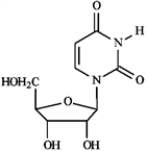
F)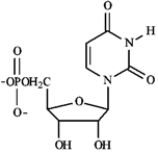
G)transcription
H)Maxam-Gilbert method
I)AUGGCUGAG
J)replication
K)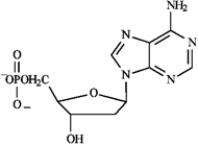
L)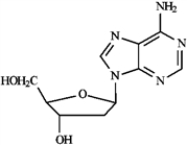
M)AGATCGCTC
process by which mRNA is synthesized
A)Sanger dideoxy method
B)GAUCGUAAA
C)Watson-Crick
D)translation
E)

F)

G)transcription
H)Maxam-Gilbert method
I)AUGGCUGAG
J)replication
K)

L)

M)AGATCGCTC

Unlock Deck
Unlock for access to all 34 flashcards in this deck.
Unlock Deck
k this deck
22
Match each of the following terms to a structure from the list below. There is only one correct structure for each term and structures may be used more than once.
DNA base sequence with cytosine at the 3' end.
A)Sanger dideoxy method
B)GAUCGUAAA
C)Watson-Crick
D)translation
E)
F)
G)transcription
H)Maxam-Gilbert method
I)AUGGCUGAG
J)replication
K)
L)
M)AGATCGCTC
DNA base sequence with cytosine at the 3' end.
A)Sanger dideoxy method
B)GAUCGUAAA
C)Watson-Crick
D)translation
E)

F)

G)transcription
H)Maxam-Gilbert method
I)AUGGCUGAG
J)replication
K)

L)

M)AGATCGCTC

Unlock Deck
Unlock for access to all 34 flashcards in this deck.
Unlock Deck
k this deck
23
Match each of the following terms to a structure from the list below. There is only one correct structure for each term and structures may be used more than once.
a purine nucleotide
A)Sanger dideoxy method
B)GAUCGUAAA
C)Watson-Crick
D)translation
E)
F)
G)transcription
H)Maxam-Gilbert method
I)AUGGCUGAG
J)replication
K)
L)
M)AGATCGCTC
a purine nucleotide
A)Sanger dideoxy method
B)GAUCGUAAA
C)Watson-Crick
D)translation
E)

F)

G)transcription
H)Maxam-Gilbert method
I)AUGGCUGAG
J)replication
K)

L)

M)AGATCGCTC

Unlock Deck
Unlock for access to all 34 flashcards in this deck.
Unlock Deck
k this deck
24
Match each of the following terms to a structure from the list below. There is only one correct structure for each term and structures may be used more than once.
uridine
A)Sanger dideoxy method
B)GAUCGUAAA
C)Watson-Crick
D)translation
E)
F)
G)transcription
H)Maxam-Gilbert method
I)AUGGCUGAG
J)replication
K)
L)
M)AGATCGCTC
uridine
A)Sanger dideoxy method
B)GAUCGUAAA
C)Watson-Crick
D)translation
E)

F)

G)transcription
H)Maxam-Gilbert method
I)AUGGCUGAG
J)replication
K)

L)

M)AGATCGCTC

Unlock Deck
Unlock for access to all 34 flashcards in this deck.
Unlock Deck
k this deck
25
Which of the following is uridine? A 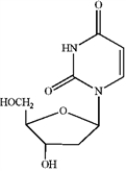 B
B 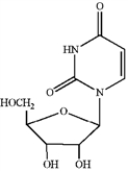 C
C 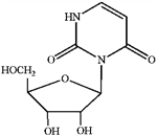 D
D 
A) A
B) B
C) C
D) D
 B
B  C
C  D
D 
A) A
B) B
C) C
D) D

Unlock Deck
Unlock for access to all 34 flashcards in this deck.
Unlock Deck
k this deck
26
Match each of the following terms to a structure from the list below. There is only one correct structure for each term and structures may be used more than once.
RNA base sequence complementary to the DNA base sequence which codes for Leu−Ala−Phe:
CTAGCATTT
A)Sanger dideoxy method
B)GAUCGUAAA
C)Watson-Crick
D)translation
E)
F)
G)transcription
H)Maxam-Gilbert method
I)AUGGCUGAG
J)replication
K)
L)
M)AGATCGCTC
RNA base sequence complementary to the DNA base sequence which codes for Leu−Ala−Phe:
CTAGCATTT
A)Sanger dideoxy method
B)GAUCGUAAA
C)Watson-Crick
D)translation
E)

F)

G)transcription
H)Maxam-Gilbert method
I)AUGGCUGAG
J)replication
K)

L)

M)AGATCGCTC

Unlock Deck
Unlock for access to all 34 flashcards in this deck.
Unlock Deck
k this deck
27
Which of the following is a definition of messenger RNA (mRNA)?
A) RNA found in the ribosome, the site in cells where synthesis of proteins takes place
B) RNA which carries a specific amino acid to the site of protein synthesis
C) RNA which has coded genetic information
D) RNA which signals cell death
A) RNA found in the ribosome, the site in cells where synthesis of proteins takes place
B) RNA which carries a specific amino acid to the site of protein synthesis
C) RNA which has coded genetic information
D) RNA which signals cell death

Unlock Deck
Unlock for access to all 34 flashcards in this deck.
Unlock Deck
k this deck
28
Match each of the following terms to a structure from the list below. There is only one correct structure for each term and structures may be used more than once.
2'-deoxyadenosine 5'-phosphate
A)Sanger dideoxy method
B)GAUCGUAAA
C)Watson-Crick
D)translation
E)
F)
G)transcription
H)Maxam-Gilbert method
I)AUGGCUGAG
J)replication
K)
L)
M)AGATCGCTC
2'-deoxyadenosine 5'-phosphate
A)Sanger dideoxy method
B)GAUCGUAAA
C)Watson-Crick
D)translation
E)

F)

G)transcription
H)Maxam-Gilbert method
I)AUGGCUGAG
J)replication
K)

L)

M)AGATCGCTC

Unlock Deck
Unlock for access to all 34 flashcards in this deck.
Unlock Deck
k this deck
29
What sequence is fully complementary to the following sequence? (5') ATCTAGTCA (3')
A) (5') TAGATCAGT (3')
B) (5') TGACTAGAT (3')
C) (5') ATCTAGTCA (3')
D) (5') ACTGATCTA (3')
A) (5') TAGATCAGT (3')
B) (5') TGACTAGAT (3')
C) (5') ATCTAGTCA (3')
D) (5') ACTGATCTA (3')

Unlock Deck
Unlock for access to all 34 flashcards in this deck.
Unlock Deck
k this deck
30
Match each of the following terms to a structure from the list below. There is only one correct structure for each term and structures may be used more than once.
DNA sequencing method for the human genome
A)Sanger dideoxy method
B)GAUCGUAAA
C)Watson-Crick
D)translation
E)
F)
G)transcription
H)Maxam-Gilbert method
I)AUGGCUGAG
J)replication
K)
L)
M)AGATCGCTC
DNA sequencing method for the human genome
A)Sanger dideoxy method
B)GAUCGUAAA
C)Watson-Crick
D)translation
E)

F)

G)transcription
H)Maxam-Gilbert method
I)AUGGCUGAG
J)replication
K)

L)

M)AGATCGCTC

Unlock Deck
Unlock for access to all 34 flashcards in this deck.
Unlock Deck
k this deck
31
Match each of the following terms to a structure from the list below. There is only one correct structure for each term and structures may be used more than once.
a pyrimidine nucleoside
A)Sanger dideoxy method
B)GAUCGUAAA
C)Watson-Crick
D)translation
E)
F)
G)transcription
H)Maxam-Gilbert method
I)AUGGCUGAG
J)replication
K)
L)
M)AGATCGCTC
a pyrimidine nucleoside
A)Sanger dideoxy method
B)GAUCGUAAA
C)Watson-Crick
D)translation
E)

F)

G)transcription
H)Maxam-Gilbert method
I)AUGGCUGAG
J)replication
K)

L)

M)AGATCGCTC

Unlock Deck
Unlock for access to all 34 flashcards in this deck.
Unlock Deck
k this deck
32
Which of the following is deoxyadenosine? A 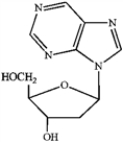 B
B 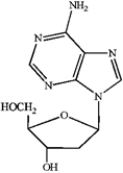 C
C 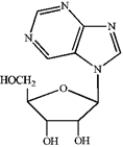 D
D 
A) A
B) B
C) C
D) D
 B
B  C
C  D
D 
A) A
B) B
C) C
D) D

Unlock Deck
Unlock for access to all 34 flashcards in this deck.
Unlock Deck
k this deck
33
Which of the following represents the general sequence of events in the catabolism of nucleic acids?
A) hydrolysis, dephosphorylation, cleavage of the sugar
B) cleavage of the sugar, dephosphorylation, hydrolysis
C) dephosphorylation, hydrolysis, cleavage of the sugar
D) hydrolysis, cleavage of the sugar, dephosphorylation
E) dephosphorylation, cleavage of the sugar, hydrolysis
A) hydrolysis, dephosphorylation, cleavage of the sugar
B) cleavage of the sugar, dephosphorylation, hydrolysis
C) dephosphorylation, hydrolysis, cleavage of the sugar
D) hydrolysis, cleavage of the sugar, dephosphorylation
E) dephosphorylation, cleavage of the sugar, hydrolysis

Unlock Deck
Unlock for access to all 34 flashcards in this deck.
Unlock Deck
k this deck
34
Match each of the following terms to a structure from the list below. There is only one correct structure for each term and structures may be used more than once.
RNA base sequence with guanine at the 3' end.
A)Sanger dideoxy method
B)GAUCGUAAA
C)Watson-Crick
D)translation
E)
F)
G)transcription
H)Maxam-Gilbert method
I)AUGGCUGAG
J)replication
K)
L)
M)AGATCGCTC
RNA base sequence with guanine at the 3' end.
A)Sanger dideoxy method
B)GAUCGUAAA
C)Watson-Crick
D)translation
E)

F)

G)transcription
H)Maxam-Gilbert method
I)AUGGCUGAG
J)replication
K)

L)

M)AGATCGCTC

Unlock Deck
Unlock for access to all 34 flashcards in this deck.
Unlock Deck
k this deck


